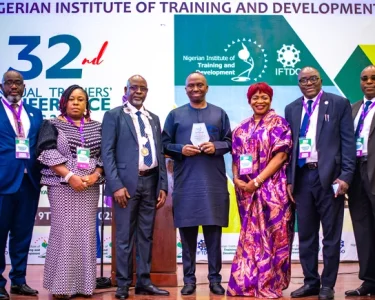Technologies such as the Internet of Things (IoT), artificial intelligence (AI), virtual reality and augmented reality (VR/AR) have been a hot topic for both businesses and governments for some time now. Their disruptive potential is no longer subject to debate, with leaders now focused on capturing the opportunities that these technologies present.
In this article, we will look at three distinct areas where leadership can take steps to ensure that the organisation is capitalising on the advantages of innovative technologies: the workspace, the work force, and the work culture. The International Data Corporation (IDC) includes these three concepts under the conceptual umbrella of “Future of Work”.
Building the new workspace -enable work from anywhere, at any time, with any device
The IDC predicted that, by 2021, 60% of G2000 companies will have adopted a future workspace model — a flexible, intelligent, collaborative virtual/physical work environment. Just like many African countries, Nigeria is keen to embrace the benefits of digital transformation. Recently, the country played host to an international online advertising technology training session with many of Nigeria’s largest and most influential publishers in attendance. The aim-to examine ways of monetising online content and using ad technology in more innovative ways.
Forward-looking organisations will enable remote working through the utilisation of cloud-based services, while automation will help them reduce their physical footprint.
The use of cloud-based services will not be limited to collaboration tools but will span core business and operational applications such as human capital management, customer relationship management, and supply chain management. These applications will be among the key support elements of strategies that focus on improved productivity and enhanced customer experience (CX).
Augment your work force-use technology to net efficiency and productivity gains
The proliferation of innovative technologies will undoubtedly impact the profile of an organisation’s workforce. Leaders will increasingly advocate the use of AI-enabled digital assistants to supplement manual labour, relieving workers of responsibility for mundane, repetitive tasks, and thus enabling them to focus on core activities. For example, Ubenwa, developed in Nigeria, utilises AI to analyse the sound of babies’ cries and give hospital workers early warnings of infant asphyxia.
And even though AI is still in its infancy in the country, Data Science Nigeria opened the first-ever AI Hub at the University of Lagos. While the hub will be geared towards mentoring and training, it will also serve as a platform to develop AI in Nigeria and focus on deep learning and identifying talent in the innovation and data analytics segments.
Additionally, financial institutions like Diamond Bank and United Bank for Africa launched AI-powered digital assistants to enhance the customer experience.
However, the effects of this technology will not only be felt in customer-facing areas. AI-enabled applications will proliferate within the organisation as well. Companies can leverage AI to determine learning paths and ensure improvements in employee experience and retention.
Build a borderless work culture
As the work paradigm evolves and brings with it new talent requirements, traditional talent sourcing models will no longer suffice for forward-looking companies. First, companies will increasingly leverage cloud-based sourcing platforms and online communities to ensure they have access to the widest pool of talent. They will utilise digital assistants to reduce the man-hours required to process applications and adaptive-intelligence platforms to improve the quality of interview-ready candidates. These changes will be done to make hiring a data-driven decision and to reduce friction throughout the process – improving the experience for the HR team and candidate alike.
Given the high population growth of Nigeria, expectations are that the country must create 40 to 50 million additional jobs until 2030. To do this, basic skill levels need to improve, and better policies and programmes must be established to meet the demand for digital careers in a connected environment.
In October last year, Oracle Academy announced a collaboration with the Federal Ministry of Education of Nigeria (FMoE) to create new computing education pathways for local students.
Through the agreement, FMoE plans to integrate the Oracle Academy computer science curriculum and resources across 10,000 academic institutions throughout the country, reaching over 1.5 million students within the region.
Over the next three years, Oracle Academy will also facilitate the training of 4,000 educators at the secondary and higher education levels to teach computer science.
Companies will start to utilise talent external to the organisation’s core workforce more, leveraging atypical working arrangements such as microwork to supplement their permanent workforce. A micro-worker is someone who performs a small task as part of a much broader project.
An example of the popularity of these micro-jobs can be seen through Wok.com.ng. This platform was designed to offer any Nigerian with a computer or cellphone that has internet connectivity an opportunity to provide sundry services from designing logos to translation services.
Innovative technologies will bring change at all levels of society and in every sector of business. Leaders that recognise where innovation can have the greatest impact on their workplace-not only in terms of where and how work is done, but also in terms of forward-thinking goals-will stand to benefit most from the disruptive power of technology.
By Tamer Farouk, Regional Senior Director-East&West Africa Applications Sales Leader at Oracle



